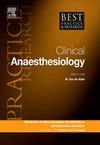Pain management in cancer patients: Could opioids or NSAIDs influence outcomes?
IF 2.8
3区 医学
Q1 ANESTHESIOLOGY
Best Practice & Research-Clinical Anaesthesiology
Pub Date : 2025-03-01
DOI:10.1016/j.bpa.2025.03.007
引用次数: 0
Abstract
Pain management in cancer patients is crucial, yet its implications on tumour progression and long-term outcomes remain an area of ongoing debate. Opioids, while effective for severe pain, may have immunomodulatory and tumour-promoting effects, whereas NSAIDs, particularly selective COX-2 inhibitors, could exert anti-tumour properties through modulation of inflammation and the tumour microenvironment. However, conflicting clinical evidence and methodological limitations hinder definitive conclusions. This review examines the current literature on the oncological effects of analgesics, highlighting the need for high-quality randomized controlled trials, biomarker-driven research, and a focus on patient-centred outcomes. Future studies should integrate advanced cancer subtyping and predictive modelling to optimize analgesic strategies while minimizing potential oncological risks. By addressing these gaps, clinicians can refine perioperative and long-term pain management approaches to improve both symptom control and cancer prognosis.
癌症患者的疼痛管理:阿片类药物或非甾体抗炎药会影响结果吗?
癌症患者的疼痛管理是至关重要的,但其对肿瘤进展和长期预后的影响仍然是一个正在进行辩论的领域。阿片类药物虽然对严重疼痛有效,但可能具有免疫调节和促肿瘤作用,而非甾体抗炎药,特别是选择性COX-2抑制剂,可以通过调节炎症和肿瘤微环境来发挥抗肿瘤特性。然而,相互矛盾的临床证据和方法学的局限性阻碍了明确的结论。本文回顾了目前关于镇痛药肿瘤效应的文献,强调需要进行高质量的随机对照试验,生物标志物驱动的研究,并关注以患者为中心的结果。未来的研究应整合晚期癌症亚型和预测模型,以优化镇痛策略,同时最大限度地降低潜在的肿瘤风险。通过解决这些差距,临床医生可以完善围手术期和长期疼痛管理方法,以改善症状控制和癌症预后。
本文章由计算机程序翻译,如有差异,请以英文原文为准。
求助全文
约1分钟内获得全文
求助全文
来源期刊

Best Practice & Research-Clinical Anaesthesiology
ANESTHESIOLOGY-
自引率
0.00%
发文量
37
审稿时长
36 days
 求助内容:
求助内容: 应助结果提醒方式:
应助结果提醒方式:


